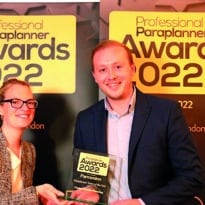Farida was profiled in our September 2016 issue. At the time she was working for UBS Wealth Management, where she had been for 10 months. When we caught up with her for the current issue, she was 15 days into a new role as financial planner at financial planning firm Paradigm Norton.
This new role is a hybrid one, where she is undertaking paraplanning but will also be CF30 to enable her to advise clients on her own in due course. “I feel that a hybrid role is more suitable for me as there isn’t the sales pressure and, being a cautious person, this has always been something I want to avoid.”
Farida began the training to become client facing whilst at UBS, where client advisers owned the client relationship and dealt with all of the investments. Financial Planners (paraplanners) would attend the meetings to provide advice on other aspects of a client’s planning needs. Ultimately, the idea was that paraplanners became fully-fledged financial planners. UBS provided development training including one-to-one role play to help ease people into the adviser role. “They provided a lot of support so that when you did move into advising you would feel comfortable in the role,” Farida says.
After two-and-a half-years with UBS Farida moved to Jarrovian Wealth, a start-up financial planning firm that had been in operation for under a year. “The proposition was really interesting and there was a focus on technology to help ease the administration burden and make the business much more scalable,” she says.
However, being a smaller company, she moved straight into an advisory role.
“Although it was a fairly new company the owners had a steady stream of clients from existing client banks along with professional connections and referrals so again, there was no immediate sales pressure on me to or hit targets, I could concentrate on providing the best advice for the clients of the firm.”
Another attraction of the firm, she says, was that she was able to be involved in so many other areas of the business. “I was on the Investment Committee, I chaired the Product and Providers Panel Committee, I created panels for VCT/EIS advice along with being able to have input into various other parts of the business. You really had to muck in and get involved and that was great. I was also involved in creating the investment proposition, seeing the entire process. I learned so much from that.”
However, that involvement across the board also turned out to be a negative of the role for Farida. “What it did was make me realise what I really wanted was to do financial planning well and to have the ability to focus on the client experience,” she says.
“I really love financial planning and being able to help people better manage their money to achieve what they want to in life. So I decided I wanted to find a home where I could focus on just that.”
Finding the right fit
This she feels she has found at Paradigm Norton. “The culture really attracted me to the company. From the start of the interview process and through all the interactions, I quickly started to feel like part of the team.
“It’s a firm that feels like it really looks after its staff. For example, they have a monthly refresher day. It’s a day in addition to your standard holiday, which you can take off to do with what you like. You have to take it during the month or you lose it. It means that at any time you are only a few weeks away from a day off. Psychologically that is a great perk.
“Also, if anyone doesn’t take the day it’s a trigger for the company to ask why and make sure the person is not overloaded with work.”
While financial planner at Paradigm Norton is a paraplanner role, Farida will be authorised to give advice in which she will attend all client meetings so clients have a dual point of contact at the firm. I will start meeting clients this way and then my role can grow organically into an advisory one,” she explains.
“I think a lot of paraplanners can be wary of moving into an advisory role especially where they get thrown in at the deep end. If I am going to be sitting in front of a client definitively saying, ‘you should do this’, I want to know that is correct. Having the qualifications is one thing but advising is a different skill set. That is where I will be honing my experience and skills in an evolving process.”
Asked whether she will step fully away from paraplanning into a full-time advisory role, she says: “My answer is definitely, maybe”.
“I know and enjoy paraplanning and I hope I do it well. I also enjoy client interaction. So for the moment this role, where I get to interact with clients as well as the research, is perfect for me. But as I grow in confidence and start to do more in client meetings, I will be able to start to lead that client relationship. So I think, it will be a matter of watch this space.
“Ultimately, I just want to help; it’s about the end client for me.”





























